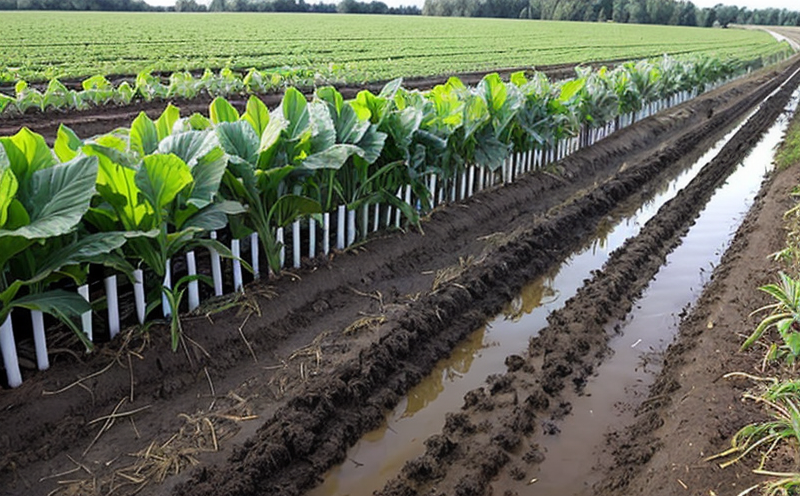EPA 160.4 Total Suspended Solids Test in Agricultural Runoff Water
The EPA 160.4 method is a critical tool used by environmental laboratories to quantify total suspended solids (TSS) in agricultural runoff water samples. This test is essential for assessing the impact of agricultural activities on surface water quality and ensuring compliance with regulatory standards.
Agricultural runoff, which includes rainwater or irrigation that picks up soil particles and other pollutants as it moves across farmland before entering water bodies, can significantly affect aquatic ecosystems. The presence of suspended solids in these runoffs not only contributes to sedimentation but also influences water clarity, oxygen levels, and the overall health of aquatic life.
The EPA 160.4 method involves filtering a known volume of agricultural runoff through pre-weighed filter paper or membrane filters followed by drying and reweighing the filters to determine the mass of suspended solids present. This approach provides an accurate measure of the TSS concentration in the sample, which is crucial for regulatory compliance.
The testing process begins with the collection of a representative sample from agricultural runoff water sources. Proper sampling techniques are vital to ensure that the collected samples accurately reflect the conditions being monitored. Once obtained, the samples undergo thorough preparation steps including filtration and drying before undergoing precise weighing.
Accurate instrumentation is essential for this method; high-precision balances with appropriate calibration play a key role in achieving reliable results. The use of standardized methods ensures consistency across different laboratories and jurisdictions, thereby enhancing data comparability and reliability.
The EPA 160.4 method aligns with broader environmental monitoring efforts aimed at mitigating the adverse effects of agricultural runoff on surface waters. By providing quantitative measurements of TSS levels in these samples, it helps policymakers and stakeholders make informed decisions regarding best management practices to reduce pollution from agriculture into water bodies.
Understanding the implications of total suspended solids within agricultural runoff is paramount for effective environmental stewardship. This test serves as a cornerstone in efforts to protect aquatic environments from contamination caused by excess sediment loadings originating from farmlands.
Applied Standards
| Standard Name | Reference Number |
|---|---|
| EPA Method 160.4 | U.S. Environmental Protection Agency, 2017 |
Eurolab Advantages
At Eurolab, we offer unparalleled expertise in performing EPA 160.4 tests for total suspended solids in agricultural runoff water samples. Our state-of-the-art facilities and highly trained staff ensure that each analysis adheres strictly to the prescribed guidelines, delivering precise results every time.
We utilize top-tier equipment calibrated according to international standards to guarantee accurate measurements throughout the testing process. This commitment to quality control is complemented by robust quality assurance protocols designed specifically for this type of environmental analysis. Our experienced personnel stay updated on all relevant regulatory changes and best practices, ensuring that our methodologies remain current and compliant with the latest requirements.
Choosing Eurolab means accessing comprehensive support services tailored to meet your specific needs related to nutrient and agricultural runoff testing. From initial consultation through final reporting, we are dedicated partners committed to helping you achieve successful outcomes in your environmental compliance initiatives or research projects involving this methodology.
Quality and Reliability Assurance
We understand that trustworthiness is paramount when dealing with environmental assessments like EPA 160.4 total suspended solids testing. At Eurolab, we uphold strict quality assurance measures to ensure our findings are reliable and repeatable.
To maintain high standards, all personnel involved in these tests undergo rigorous training programs focused on the latest techniques and best practices. Our lab is equipped with advanced analytical instruments regularly calibrated against recognized reference materials provided by reputable organizations such as NIST (National Institute of Standards & Technology).
Additionally, Eurolab participates actively in inter-laboratory comparison exercises organized by bodies like APLA (Association for the Promotion of Laboratory Accreditation) to verify the accuracy and consistency of our results. These efforts further enhance confidence in the integrity of our analyses.





